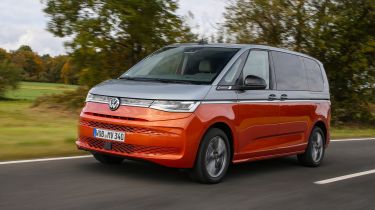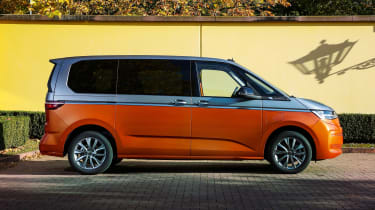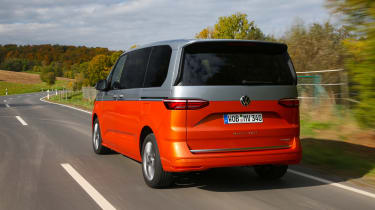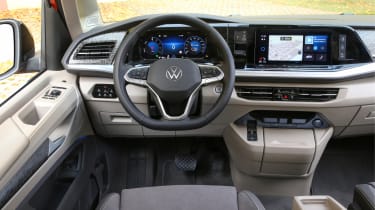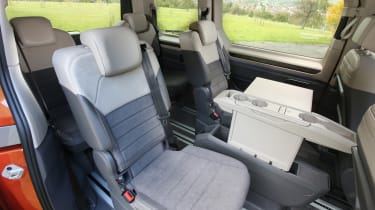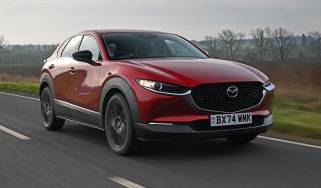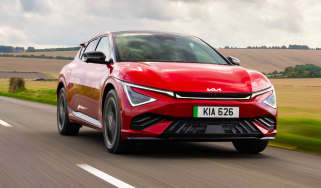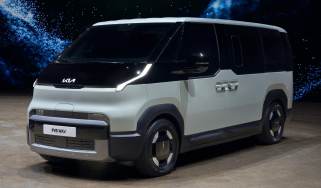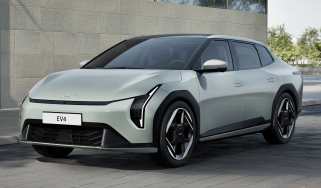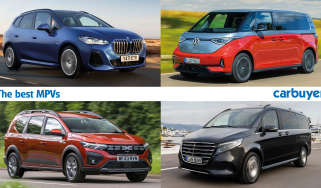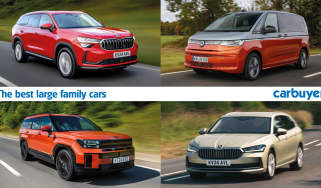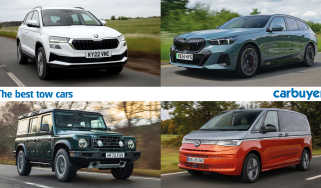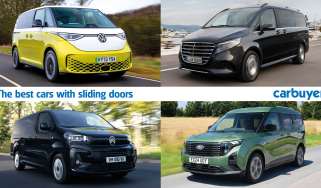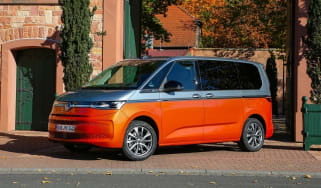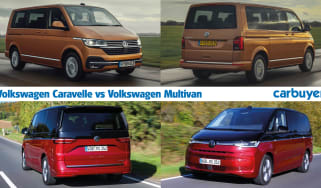Volkswagen Multivan MPV review
"The Volkswagen Multivan represents a successful update of VW's popular posh MPV but it's expensive"
Pros
- Spacious
- The latest tech
- Plug-in hybrid available
Cons
- Expensive
- Overshadowed by ID. Buzz
- Vague steering feel
The Volkswagen Multivan replaced the Volkswagen Caravelle, which had built up quite a loyal fanbase over the years. It was a more upmarket alternative to the Volkswagen Transporter Shuttle, and the Volkswagen California was the campervan version of the Caravelle. The Multivan boasts some significant upgrades over the previous Caravelle, which should attract fans, not least its attractive modern styling.
Less attractive is the plug-in model’s expensive price tag – it starts from nearly £50,000 in its most basic trim, to around £60,000 and beyond in top spec, so many will prefer to wait a few years until used examples become available.
 Volkswagen Caravelle vs Volkswagen Multivan: old vs new
Volkswagen Caravelle vs Volkswagen Multivan: old vs new
That’s asking a lot for a seven-seater MPV, especially after the rise in popularity of SUVs, many of which offer just as many seats. There aren’t many direct rivals to the Multivan, although the Mercedes V-Class offers a similarly premium-feeling experience for a car of this size. More mainstream alternatives include the Peugeot Traveller and Ford Galaxy, or you could opt for an SUV such as the Kia Sorento in top-spec or an entry-level Land Rover Discovery for a similar price.
The Multivan still offers the advantage of van-like interior space without a commercial feel once you get inside. Rails allow the rear seats to slide and swivel by 180 degrees, while a storage cubby with a fold-out table can travel along the middle of the MPV to where it's wanted. There's also a 469-litre boot behind the third row of seats, which is something very few cars can offer. In the long-wheelbase version, cargo space with the rear seats removed is 4,005 litres, with the only downside being the inevitable calls from friends and family to help with house moves.
Volkswagen's latest infotainment setup and technology has been neatly integrated into the Multivan's upright dashboard, and it all looks contemporary and fresh. VW's media software has come in for some criticism in the Golf but the 10-inch touchscreen looks sharp and responds quickly to inputs.
Buyers can specify a Multivan in two regular trim levels, now that the special launch edition version is no longer available. The Life and Style models are both well equipped as standard, with features including 16-inch alloy wheels, electric latching sliding doors, sat-nav, as well as lane-keep assist and an automatic emergency braking system that will stop you from hitting the car ahead if it brakes suddenly. At the top of the range, the flagship Energetic Launch Edition got a more extensive list of standard equipment, including a premium stereo system and a panoramic sunroof.
The Multivan’s smooth-looking face might lead some onlookers to think that it’s a fully electric model, but there’s no zero-emission powertrain option here. That kind of drive is taken care of by the Volkswagen ID. Buzz – VW’s modern interpretation of its classic T2 Microbus, which is likely to attract more attention than the Multivan even if you specify the striking two-tone paint option.
In a surprise move for such a large vehicle, there was no diesel at launch, with Volkswagen instead offering a plug-in hybrid (PHEV) choice and two petrol engines. A conventional 148bhp 2.0-litre diesel has now joined the range, and should suit the Multivan well. The PHEV uses the same 1.4-litre TSI petrol engine, electric motor and 10kWh battery combination seen in the Golf and Passat GTE. With 215bhp, it sounds powerful, but the reality is a bit more pedestrian, with smooth but gentle acceleration. There’s also a rather harsh noise from the combustion engine when it’s made to work hard. Handling feels secure and light steering helps disguise the Multivan's size while manoeuvring in tight car parks.
We like the Multivan's sharp new design, interior space and clever seating, but it's very expensive in plug-in-hybrid guise. The petrol versions are cheaper, but given that owners of these cars tend to rack up lots of miles, we're not sure how acceptable the 35mpg fuel economy figure will be. Yet while diesel is becoming increasingly unfashionable, it suits a large vehicle like this very well, and will be the best choice for high-milers. No MPG figures have been released, but Volkswagen promises up to 620 miles on a tank of diesel.
MPG, running costs & CO2
The big news here is the eHybrid powertrain, which is similar to the plug-in hybrid setup already found in the Volkswagen Golf GTE and Volkswagen Passat GTE. It pairs a 1.4-litre petrol engine with an electric motor, along with a 10kWh battery. When fully charged at home or using a public charge point, this gives it a zero-emissions range of around 30 miles on pure electric power.
With official fuel economy figures around the 150mpg mark and CO2 emissions of under 50g/km, the Multivan eHybrid slips into a low tax band for company-car drivers. Charging the battery pack from 0-100% takes just under 3.5 hours using a 3.6kW wallbox.
In a move that shows just how much Volkswagen's approach has changed in recent years, the only other engines available at launch were petrol. There's a 134bhp 1.5-litre petrol engine on Life trim that achieves up to 35mpg and a 201bhp 2.0-litre version for the Style model that returns a hot hatch-like 31mpg. These have now been joined by a 148bhp 2.0-litre TDI diesel that is paired with an automatic gearbox as standard and is likely to achieve at least 40mpg. While the plug-in hybrid’s figures are more impressive on paper, its fuel economy will drop sharply if you can’t charge it frequently.
Engines, drive & performance
The Multivan might be quite a bit more advanced than the old Caravelle but it still feels like a van once you get out on the road. The steering is very light and there's almost no feel for what's going on between the wheels and the road, but at least it doesn't lean over too much in bends.
In town, the light steering makes the Multivan feel easy to manoeuvre, helped by its tight turning circle. Anyone used to driving an SUV is likely to feel right at home behind the wheel, thanks to its high seating position and good visibility.
With 215bhp from the petrol engine and electric motor, the eHybrid doesn't feel quite as sporty as the headline power figure may suggest. This is made evident by its mediocre 11.6-second 0-62mph acceleration figure, and the Multivan never feels especially punchy. There's smooth acceleration, especially from the electric motor, but the petrol engine sounds slightly coarse when it kicks in to lend a hand.
We’ve since driven the 2.0-litre petrol, as well, and despite its strong power output it never really impresses. It misses out on the PHEV’s instantly available torque, so feels laboured getting up to speed. That’s especially true when it’s fully laden with people and/or stuff. It doesn’t feel anywhere near as nippy as the on-paper stats suggest. Given that it’s still quite expensive and much thirstier than the plug-in hybrid, this engine might only suit people who won’t consider a diesel and don’t have access to a charger.
Interior & comfort
The Multivan is fitted with VW’s latest infotainment setup, as seen in the current Golf. The 10-inch infotainment screen is sharp and responsive and when paired with a 10.25-inch 'Digital Cockpit' and head-up display, it gives the Multivan an upmarket feel – this is an expensive MPV after all.
Most of the surfaces you'll touch, including the steering wheel and dashboard, have a quality feel but it's easy to find some hard plastics if you're sat in the back or go hunting in the lower reaches of the interior. A panoramic sunroof is offered for the first time, and an integrated eSIM means there's a permanent connection for online services and connecting to the Multivan remotely via a smartphone app.
Every version of the Multivan is well-equipped, with the entry-level Life trim getting 16-inch alloy wheels and electrically latching dual sliding doors. Standard safety features include lane-keep assist and an automatic emergency braking system that will stop you from hitting the car ahead if it stops suddenly. Opt for the Style trim, and 17-inch alloys are added along with upgraded Matrix LED headlights. This model also gets fully electric side doors, sat-nav, a powered tailgate and a park assist system that automatically controls the steering as you park. Hunt out a second-hand Energetic Launch Edition and you get 18-inch alloys, a Harmon Kardon premium stereo system, tinted rear windows and a panoramic sunroof.
Practicality & boot space
The seven-seat Multivan is designed for its rear occupants as much as those in the front and so there's now a new party trick in the back. A rail system allows the second and third rows to slide forwards and backwards, or turn 180 degrees. In higher-spec versions all seven seats can be heated and the individual seats are also 25% lighter to make it easier for one person to remove them for maximum luggage space. It's also possible to specify the Multivan with six seats, but you’ll need the Volkswagen Transporter Shuttle if you want or need more than seven seats.
 The best 7-seater cars to buy in 2025
The best 7-seater cars to buy in 2025
A central table can also slide up and down the interior, giving the front, middle or rear passengers cup holders and a height-adjustable fold-out table. It's handy but the creviced rail system does look like the perfect collection device for dirt, crumbs and other debris. There are USB charging ports, air con controls and storage bins throughout the interior, ensuring the Multivan feels like a base camp on any family expeditions.
Upfront, the storage areas continue. With the gear selector moved to the dashboard, there’s a wireless phone charging tray, plus a dash-top cubby, hidden cupholders and multiple storage pockets in the doors.
There's also more outright space than in the outgoing Caravelle, with 469 litres behind the third row of seats, stretching to 1,844 litres with the rear seats removed. The Ford Galaxy can manage only 300 litres with all seven seats in use. With both rear rows removed, there's 3,672 litres or a huge 4,005 litres in the long-wheel base version.
Reliability & safety
Although the Volkswagen Multivan did not feature in our 2022 Driver Power customer satisfaction survey, it uses the same tried and tested engines as the Volkswagen Golf, including its plug-in hybrid powertrain. Owners have been less than impressed with the Golf’s reliability, it must be said. Volkswagen as a brand came 18th out of 29 manufacturers overall, with 18.6% of Volkswagen owners reporting issues in the first year of ownership.
The Volkswagen Multivan achieved an impressive five star Euro NCAP safety rating, but this is no surprise given it’s based on the same MQB underpinnings as the Volkswagen Golf and Passat, which both also achieved five stars.
The MQB platform also brings VW's latest safety kit, including features like autonomous emergency braking, lane keeping and road sign recognition. It's also equipped with 'Car2X', which can communicate with other vehicles and local infrastructure to warn of delays and hazards in the area.

